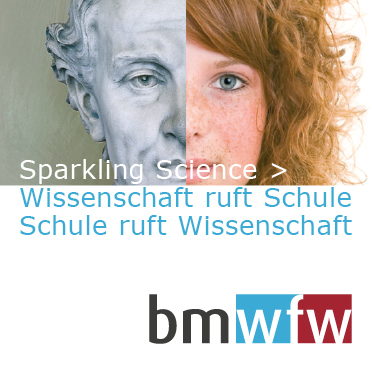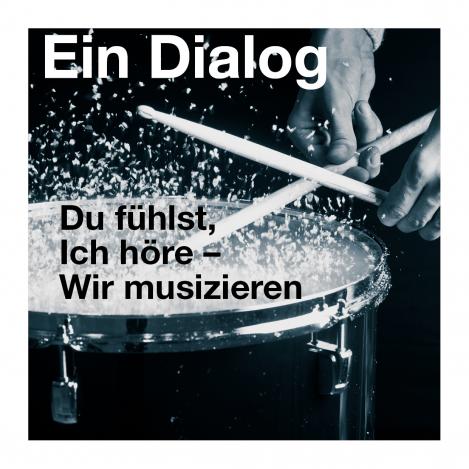Du fühlst, ich höre, wir musizieren - ein Dialog
You Feel, I Listen, We Make Music – A Dialogue
Forschungsprojekt im Rahmen von Sparkling Science 2012
"Du fühlst, ich höre, wir musizieren - ein Dialog" -
Entwicklung von adäquaten Unterrichtsmodellen für inklusive und integrative Kontexte mit heterogenen Gruppen
Das Projekt „Du fühlst, ich höre, wir musizieren – ein Dialog“ hat zum Ziel, adäquate Unterrichtsmodelle für inklusive und integrative Kontexte mit heterogenen Gruppen (hörende, hörbeeinträchtigte und gehörlose Schüler/innen) zu entwickeln.
Im Rahmen eines in das Gesamtprojekt integrierten interaktiven Musikprojektes sollen mittels gemeinsamen Erfindens, Musizierens (Probens, Präsentierens) und Handelns sowie im gemeinsamen Dialog zwischen allen hörenden, hörbeeinträchtigen und nichthörenden Teilnehmer/innen jene Erfahrungen und Erkenntnisse gewonnen werden, die zur Erreichung der Projektziele dienlich sind.
Das interaktive Musikprojekt übernimmt so innerhalb des Gesamtprojektes eine Schlüsselrolle: Im Musikprojekt soll von allen Beteiligten gemeinsam eine „Komposition“ mit unterschiedlichen persönlichen Stilen und Formen künstlerischen Ausdrucks erfunden, geprobt und am Ende der Laufzeit im Rahmen einer Gesamtveranstaltung präsentiert werden. Alle Beteiligten müssen auf dem Weg zur Realisation dieses Zieles eine gemeinsame (musikalische, …) Sprache und funktionierende Formen gemeinsamen Handelns finden und entwickeln. Sie erarbeiten auf diese Weise notwendige Voraussetzungen für das erfolgreiche Gelingen des geplanten Musikprojektes und entwickeln in diesem Prozess zugleich in der Praxis erprobte Formen funktionierender Zusammenarbeit in heterogenen Gruppen. Ins Zentrum der Aufmerksamkeit rücken damit von Beginn an wichtige Parameter inklusiver Lernumgebungen: Gemeinschaft bilden – Gewaltfreie Kommunikation (Marshall B. Rosenberg), eine Schule für alle Schüler/innen entwickeln – Unterstützung für Vielfalt organisieren, Lernarrangements organisieren – Kooperatives Lernen (Norm & Kathy Green); Quelle: http://www.inklusionspaedagogik.de/.
Auf dem Weg zur gemeinsamen „Komposition“ erhalten die Schüler/innen genaue Anleitungen u.a. in Instrumentenbauworkshops, im Umgang mit Instrumenten und musikalischen Ausdrucksmitteln (Rhythmus, Klang, Melodie, …), in Kommunikation (allgemein, musikalisch) und Improvisation sowie im Rahmen von Reflexionen zur Artikulation der gemachten Erfahrungen.
Die wissenschaftlichen das Projekt begleitenden Werkzeuge sind einerseits die bekannten wie Tagebuch, Protokolle, Supervision und mediale Dokumentation (Film und Foto). Andererseits aber auch dem im künstlerischen angesiedelten Forschungsgegenstand entsprechend Zeichnungen, Aufsätze, Gedichte, Aphorismen, stimmliche und instrumentale Klangimprovisationen und natürlich qualitative Tiefeninterviews - eben subjektive Outputs der am Projekt Beteiligten als Spiegel der künstlerischen Erlebnisse und Erfahrungen des Einzelnen und der Gruppe. Outputs, um die persönlichen zwischenmenschlichen aus der Begegnung resultierenden Erfahrungen und inneren Veränderungsprozesse zu reflektieren und überhaupt dokumentieren zu können. Beide Zugänge unterstreichen somit den ganzheitlichen Gesamtansatz des Projektes und spiegeln diesen wider.
Die Schüler/innen übernehmen somit einen wesentlichen Part zur Erreichung der Projektziele, indem sie mit ihren kreativen und künstlerischen Leistungen entscheidend an der Gestaltung der gemeinsamen „Komposition“ mitwirken sowie ihre im Rahmen der Projektarbeit geäußerten Erfahrungen, Ideen und Impulse für die Entwicklung von adäquaten Unterrichtsmodellen für inklusive und integrative Kontexte mit heterogenen Gruppen nutzbar machen.
Am beantragten Projekt werden direkt bzw. indirekt teilnehmen:
- Schüler/innen des Bundesinstitutes für Gehörlosenbildung (BIG) und dessen Partnerschulen
- Lehrende des BIG
- Studierende der Universität für Musik und darstellende Kunst Wien (mdw) und
- Lehrende der mdw
- Wissenschafter/innen
- Umfeld (Eltern, …)
__________________________________________________________
“You Feel, I Listen, We Make Music – A Dialogue,” – Development of adequate pedagogical approaches for inclusive and integrative contexts with heterogeneous groups.
University for Music and the Performing Arts Vienna, Hellmesberger-Institute
Bundesinstitut für Gehörlosenbildung Wien (The Federal Institute for the Education of the Deaf, Vienna.)
The goal of the project “You Feel, I Listen, We Make Music – a Dialogue” is to develop adequate pedagogical approaches for inclusive and integrative contexts with heterogeneous groups comprised of hearing, hearing-impaired and deaf students.
Within a music project integrated within the project as a whole, experiences and insights with the potential to lead to the achievement of the project goals will be won by mutual exploration, music making (rehearsing, performing), and activities, as well as through dialogue between all hearing, hearing-impaired and deaf participants.
The interactive music project thus has a key role within the overall project: in it, all participants will collaborate on a “composition” involving various personal styles and forms of artistic expression, from initial development and composition, through rehearsal, culminating in a final performance and presentation within the framework of a larger event. In order to achieve this goal, all participants will need to find and develop a common (musical, …) language and a functional common process. Thus, they will develop the prerequisites for the success of the planned music projects as well as practice-proven forms of successful collaboration in heterogeneous groups. This brings the following important parameters of inclusive learning environments to the center of attention: community development –nonviolent communication, development of a school for all pupils, organizing support for diversity, organization of learning arrangements – cooperative learning (Norm & Kathy Green); Source: http://www.inklusionspaedagogik.de/.
In order to help the pupils develop their collaborative “composition”, they will receive precise guidelines in diverse areas including instrument-making workshops, interaction with both musical instruments and methods of musical expression (rhythm, tone, melody, …) communication (general, musical), improvisation, and reflection on means of articulating their experiences.
The scientific tools accompanying the project are, to begin with, well-established ones, including diary entries, minute-taking, supervision and medial documentation (film, photography). Going beyond these tools, in accordance with the artistic basis of the subject matter, more subjective output from the project participants, such as drawings, essays, poems, aphorisms, vocal and instrumental sound improvisation and, of course, qualitative in-depth interviews, will be used to cast light on both the individual and group experience. Such output is necessary in order to reflect and document the experiences gained through interpersonal interaction and the processes of inner change. Thus, both approaches underline and mirror the overall aim of the project.
The students thus take on an integrative role in fulfilling the project goals as they, through their creative and artistic achievements, have a significant impact on the structure of the collaborative “composition”; also, in the context of their work within the project, students’ experiences, ideas, and impulses will be useful for the development of adequate education models for inclusive and integrative contexts with heterogeneous groups.
Direct and indirect participants of the requested project will include:
- Pupils of the BIG and its partner schools
- Teachers from the BIG
- Students of the University for Music and Performative Arts Vienna (mdw)
and
- mdw Teachers
- Scientists
- Environment (Parents, …)


